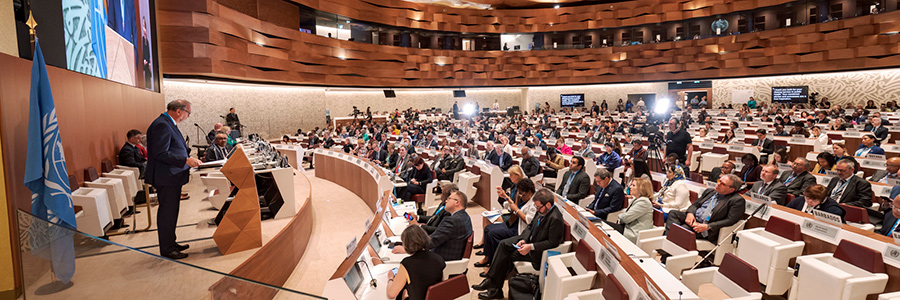‘The use of phages in the UK has been stymied by the lack of dedicated support and funding, suitable infrastructure for their production, and lack of detailed regulatory guidance […]’
The UK government has used the World Health Assembly (WHA), being held in Geneva, Switzerland 21 to 30 May, to launch its Global Health Framework for 2023-2025. As well as reaffirming the UK’s commitment to meeting the Sustainable Development Goals, the Framework is said to place the UK ‘at the centre of the global health agenda’.
The aims of the Framework include: Advancing the UK’s leadership in science and technology; improving preparedness and response to future epidemics, pandemics, drug-resistant infections and climate change; and reforming ‘global health architecture’, including through a strengthened World Health Organisation (WHO).
Ahead of the WHA, the WHO released the 2023 edition of its annual World Health Statistics report. It includes new figures on the impact of covid-19, and statistics on progress towards the health-related Sustainable Development Goals. The WHO said that the report ‘Underscores a stagnation of health progress on key health indicators in recent years compared with trends seen during 2000-2015. It also alerts us to the growing threat of non-communicable diseases and climate change, and calls for a coordinated and strengthened response.’

Professor Peter Piot gives remarks after receiving a Global Health Leader Award from WHO Director-General Dr Tedros Adhanom Ghebreyesus. Credit: © WHO / Antoine Tardy
At the same time as making the new Framework public, the UK government said that it was providing funding of up to £39 million for research into antimicrobial resistance (AMR) through the Global AMR Innovation Fund – a UK aid fund supporting research and development around the world to reduce the threat of AMR in low and middle income countries.
The funding includes up to £25 million for CARB-X (Combating Antibiotic Resistant Bacteria Biopharmaceutical Accelerator) – a global AMR research initiative supporting the early development of new antibiotics, vaccines, and rapid diagnostics to combat drug-resistant infections.
To learn more about new developments for tackling antimicrobial resistance, MPs from the UK’s Parliamentary and Scientific Committee visited the laboratories of UCL, in London. The visit by MPs Stephen Metcalfe and Carol Monaghan related to a recent inquiry by the Committee into the antimicrobial potential of bacteriophages, which could be used instead of, or alongside, antibiotics.
@UCLSTEaPP Professor Sarah Edwards met with MPs and Committee members Stephen Metcalfe and Carol Monaghan when they visited UCL last week https://t.co/Pp304ykleF pic.twitter.com/qDPom1U8H6
— UCL STEaPP (@UCLSTEaPP) May 22, 2023
The visit to UCL was prompted by evidence submitted to the inquiry by Professor Joanne Santini, a leading expert in the study of bacteriophages. Professor Santini said: ‘While phages have been used as antimicrobials for over 100 years, their use in the UK has been stymied by the lack of dedicated support and funding, suitable infrastructure for their production, and lack of detailed regulatory guidance recognising the unique opportunities and challenges of the technology as a medical treatment.’
Stephen Metcalfe, current Chair of the Parliamentary and Scientific Committee said; ‘This visit will be particularly useful as the Committee considers evidence as part of our current enquiry into the antimicrobial potential of bacteriophages.’
The use of phages came out on top at the 2023 Bright SCIdea final, which took place in March. Team Phagel, from UCL, won the £5,000 prize for its hydrogel mix containing a combination of bacteriophages for use in the treatment of burns.
